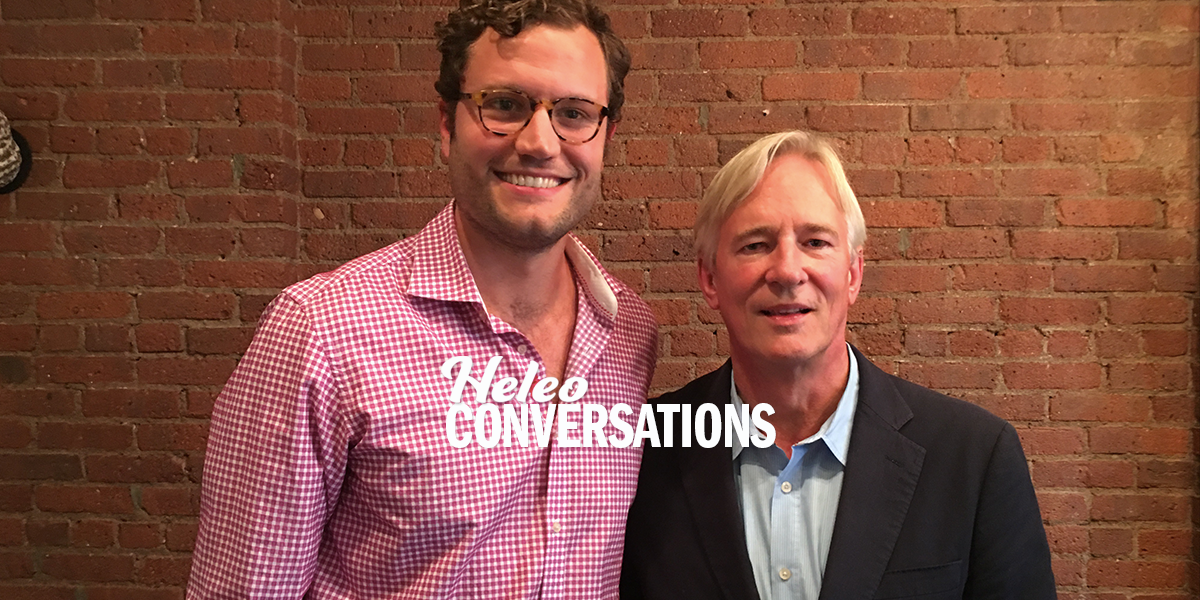Brian Fetherstonhaugh, the global Chairman and CEO of OgilvyOne Worldwide, recently joined writer and entrepreneur Ben Casnocha for a Heleo Conversation about how to plan for a satisfying and successful career. They consider how to apply the lessons from Fetherstonhaugh’s new book, The Long View, in tandem with the entrepreneurial advice from Casnocha’s The Start-Up of You.
Ben Casnocha: One of the core challenges of career strategy is how to think about your long-term future, but also stay open and flexible to short-term opportunities and changes. How do you advise people to reconcile the long and short term?
Brian Fetherstonhaugh: People tend to take much too short a view of careers. When you do the math, this is forty or fifty years—you’re going to have to live through different companies, different jobs, disruption of your industry. With that in mind, you still need to take action now to make yourself ready and robust for this incredibly long journey.
Ben: When someone’s graduating from college today, should they devise a career plan that looks out fifty years or should they only focus on the next six, twelve months?
Brian: They need to get busy about the here and now. There are three main stages of a career, they fall naturally into almost fifteen-year chunks. The first one is all about discovery. I encourage people in the early stages to try different things, discover, take on what I call ‘career fuel.’ You’ll discover later on what it’s going to turn into. It’s hard to predict these days more than a couple of years down the road.
Stick around long enough so that you’re actually good at something.
Ben: Reminds me of something David Brooks wrote, that you should consider your twenties the Odyssey years. Try lots of different things, be highly experimental, expose yourself to randomness. Then hone in on a path later in life. What does that mean practically speaking? Are you saying that you should spend a couple of years abroad, a couple of years at one job, try different industries and then stage two is when you double down?
Brian: It’s a great question. A lot of people figure that you have to have lots of short chapters. I encourage people to do them in longer hits. I’m a big believer in creating some mastery. Stick around long enough so that you’re actually good at something. Then it creates a transportable skill. You go into a job and the first year you’re figuring out what the company is and where the restrooms are and who reports to whom—if you leave right away, you don’t carry enough with you.
You want to carry three kinds of fuel in this first stage. Number one: transportable skills. These are things like, can you communicate? Are you building EQ and judgement? Are you learning how to take risks? There’s a whole set of skills that can last through different industries, different countries, different companies and are incredibly valuable. Transportable skills is one.
The second one, which you alluded to, is meaningful experiences. Part of it is just getting outside your comfort zone. In that first fifteen years, you may not have many family responsibilities and financial obligations, so go try some stuff and look for flop sweat. Look for moments when the palms are sweating. Launch a product, do something—
Ben: Flop sweat?
Brian: Flop sweat. The fear of failure. If you’re not experiencing some kind of flop sweat early on, you’re probably not putting yourself out there enough.
Nobody stands up at the end and says, ‘Thank you for coming to my retirement party. I’d like to thank my eighteen hundred and sixty-five LinkedIn connections.’
Third, start to accumulate some enduring relationships. I talk to people who say, “It’s great. I’ve got eighteen hundred and sixty-five LinkedIn contacts and fifty-seven hundred Facebook friends.” I’ve seen a lot of longstanding careers. Nobody stands up at the end and says, “Thank you for coming to my retirement party. I’d like to thank my eighteen hundred and sixty-five LinkedIn connections.” They say, “There are three people who made a difference.”
Trending: Navy SEAL Secrets for High Performance Under Pressure
One of the things to do early on is to be able to spot and nurture some really big, meaningful relationships. It’s not a volume game, it’s a quality game.
Ben: On transportable skills, [Reed Hoffman and I] make a similar argument in The Start-Up of You. We say, “If you’re choosing between two opportunities and all else being equal,”—all else is rarely equal but suppose—”prioritize the types of experiences that provide maximum optionality.” This is why consulting tends to be a pretty good thing for smart people to do. You’ll learn a bunch of different skills and can apply them in the non-profit sector, as an entrepreneur, as an executive, as a product manager, as a marketing person.
What were some of the transportable skills that you learned early on? What did you do in your first day? Because now you’re on top of a large five thousand person plus global marketing organization.
Brian: At Procter and Gamble we were great at writing. We could do critical analysis and write. I could write two page memos just perfect.
Then I went into advertising and was asked to speak. I couldn’t. In any room with more than two people, I was paralyzed from the top of my head to the base of my spine. So I really worked at it. I was pathetic for a while and I started doing more and more, just speaking and announcing people’s birthdays and little things. Now you can’t shut me up. That’s been a phenomenal long-term skill.
Ben: It’s always great to pick skills that other people are not so good at because it’s easier to hack your way to the top of the leaderboard, as it were. Public speaking is one of those things, writing too, where it’s easy to differentiate yourself. That’s a theme that runs through any smart career strategy—you have to be cognizant of the competition. If everyone is learning skill X, maybe you should learn skill Y. Hiring, growing your own organization, you’re looking for somebody who can bring something different to the table.
Brian: I tell people whether you like it or not you’re a career brand and you’re up on a shelf and employers are shopping around and they might pick up the box and check what ingredients are inside. Do you have good ingredients? Do you have people who will endorse you? All the good jobs, even not-for-profit jobs, are wildly competitive.
Ben: It reminds me of Scott Adams, who created the Dilbert cartoon series. He has this line—if you want be world class, in terms of skills, either become top one percent in a single skill or top ten percent in two or more skills and combine them. In my own career, I thought about my skills in entrepreneurship and my skills in writing, I’m not actually top one percent in either but bring the two together and you offer something different. What are the skills that you developed where people think, “Wow, it’s these things that have made him so successful”?
Some people are the bricks and some people are the cement between the bricks. Sometimes being the cement is a very powerful place to be…
Brian: Certain integrated marketing things. I worked in the brand side of marketing, in the deep digital and data side of marketing globally. The other skill is I’m a very good connector. My first global assignment was running eleven hundred people in thirty-eight countries. I learned really fast. It clicked with me and I discovered that doing a connecting-type job has been differentiating for me, it really helped me out.
Ben: Some people are the bricks and some people are the cement between the bricks. Sometimes being the cement is a very powerful place to be, if you can bring people together and live at the intersection of ideas and disciplines.
Let’s grapple with a tactical question that probably you and I both struggle with—the dilemma of should I spend more time with people I already know and deepen my existing set of personal and professional relationships? Or should I go have coffee with the new person, go to new networking events, and meet new people? How have you balanced?
Brian: I encourage people to go far and wide. Have a big social profile, bump into people, collide with people, introduce yourself to new people. And from that group will come a smaller group that I call the community of experts. The nature of these community of experts relationships is, if I have a question, I’ll phone you. You’re an expert in writing and entrepreneurship and after this, I could easily phone you and say, “I’ve got a question,” and I will reciprocate.
There’s a next level up, which I call critical call links. Who are the people who will be decisive in making you succeed or fail in your current situation? It could be a boss. Often it’s the boss’s boss because even if your boss wants to promote you, the boss’s boss needs to say yes.
Then the next layer up is that little super layer of champions. It’s literally a handful of people. They’re a tailwind. They like you and they can come from all kinds of different places—not just your official boss or mentor at work.
Ben: People sometimes invoke this idea of Dunbar’s number, you only have a hundred and fifty people you can know. In fact, it’s really much more nuanced than a single number because at different layers of intimacy, you have different capacity to maintain those relationships. Psychologists say there’s only a very small number of people whose deaths would truly devastate you. There’s another circle of people to whom you might send a Christmas card.
Your point on the community of experts—I think that’s really important. For real business decisions, often we need the insights in someone’s head, right? You can’t read it in a book, can’t find it in Google. I’m curious, what’s an example or two from where you’ve thought, “I’ve got an issue and I’m going to reach out to Jane or Bob or whoever?” How did it benefit you?
Brian: I use that community of experts every single day. This morning, our company is working on a proposal to do some new loyalty marketing work. There’s one person who lives in Colorado who’s a total wizard. We’re on the phone with them and in ten minutes they can give me the wisdom of a lifetime. You just go, “Bingo. That’s the missing piece. That’s the answer I was looking for.” I’ve been operating globally for twenty years so literally twenty-four hours a day I can work the time zones. I don’t need to know the answers. I know somebody who knows the answers can give me a wise, balanced answer, not a Wikipedia answer.
Trending: How to Make Menopause the Best Time of Your Life
Ben: How do you think about reciprocity dynamics? Imagine if you had a friend who called and called for help but you think to yourself, “I’m not sure I actually need much from this person.” As you become more successful over time, there are more people who want stuff from you than the reverse.
Brian: I always try and include some signal of good faith to separate out from all those other people who are transactional, they’re going to ask for something and never give. In Adam Grant’s book Give and Take, it’s compelling that the people who proactively give without expectation, they seem to be successful and very happy in their work.
Ben: I find a lot of young people at the beginning of their career say, “Sounds great, in theory, but how am I supposed to help Brian? How could I possibly help you?” What are some examples of ways that someone coming out of school today could actually help you to such a degree where you would be more responsive, that you would be part of their community of experts?
You can be the world expert on something if you define it in the right way.
Brian: Last Thursday one of the interns who worked at Ogilvy presented a 40 page document that she’d been working on for six weeks. It was first class work. I said, “This is very good work. You didn’t just organize your opinion, you put footnotes. Corroborated, trusted sources.” Here’s a person who’s twenty or twenty-one years old, hasn’t even graduated yet, is giving me something of such high quality I will share it. We’ve already shared it with our global network.
In our business, young people, say, “I want to go see a client. I want to be at the big table.” I go, “What are you going to do? If you’re not prepared you’re going to sit there like a bump on a log. Why don’t we find a topic that you are phenomenal at or want to learn more about, spend a month becoming one of the world’s greatest experts in that little thing and then a month from now we’ll offer up.” That is a killer little bit of micro-mastery you can do starting on week two.
Ben: I love that example because it emphasizes the importance of picking a niche. Something very micro, very specific and really, really deep. You can be the world expert on something if you define it in the right way.
I always recommend people do free work. Volunteer. You might have a job description that’s X. Do X + 1 and the 1 is something that’s different and new.
It addresses a question I often get from folks early in their career: “I want to break into this industry, but in the current economy, these job descriptions say, ‘Minimum two years experience required.’” If the entry level job requires experience, how do you get the experience for the first time? What I often say is, “Get some other job and then volunteer on the side to build some of that expertise. Nights and weekends.”
If you’re in marketing but you want to get into product management at a tech company, start writing product specs on the side. Take a class online, do volunteer work, call up the VP of product and see if you could do some stuff on the weekends. That’s how you break in. That sort of hustle can be really valuable.
Brian: That’s great advice, not only to do it but do it in a tangible way. Don’t just think about a topic: write it down, put it in a one-minute video, make it a product. Create a three-minute or five-minute presentation, buffed and footnoted and rehearsed. That really stands out. It creates belief in your potential and capabilities.
Ben: Do you find that there are trade-offs between success and happiness? You’re CEO of a big company, you’ve reached the peak of success in some model, but are you actually happier? And is that a worthy ambition?
Brian: Here are four questions that I’m starting to ask myself every year:
1. Am I learning?
2. Am I having impact?
Trending: Microsoft, Google, and Beyond: What Business at the Cutting-Edge of AI Looks Like
3. Am I having fun?
4. Am I being fairly rewarded?
In addition, I do an exercise that I call the one hundred hour test. There are a hundred waking hours in a week. How do you spend them? What percentage is on work? What percentage is on community, family, teaching and learning? So many people work seventy-five hours a week. With no friends, no family, no community, not teaching and learning: it’s a recipe for burnout in almost every person I know.
I’m not afraid of hard work, I can still work in small spurts for eighty or a hundred hours a week. But it’s not sustainable.
In my late twenties, I discovered a couple of things. I discovered not for profit work. I started working with Goodwill Industries and I still work with them to this day. I go there and it’s like a vitamin shot. Those two hours have an immense impact on my energy level and happiness. Saturday mornings at eight-thirty in the morning I take a guitar lesson. I’m not a natural musician but I really work at it. That time is incredibly energizing to me.
I encourage people, as they’re looking at what makes them happy, to ask the four questions and then say, “How am I spending my time?” Those two things add up.
Ben: There’s an interesting philosophical question related to this, which is, how much should we trust our own intuitions about ourselves? Self-delusion is rampant and we have lots of cognitive biases that distort the way we think. One of the things I find helpful when thinking about these questions is to explore them in concert with people we trust. Explore them in concert with people in our network.
Sometimes it’s only in conversation with an objective third party, a person might say, “Hey, you’re telling yourself you’re happy but you look like shit.”
Brian: Yeah and you’re bringing it to work.
Ben: Right? Sometimes you need that. That’s where this all comes together. You want people in your life, in your professional life, who can engage you on these questions and help you come to some higher truth.
Brian: That’s where, in the pursuit of these big, lofty, long-term objectives, having enduring relationships and a few people you can trust who will tell you truth, who represent your past but also your future, is an incredibly powerful way to keep you on the right path.
This conversation has been edited and condensed. The full video can be viewed below.



























